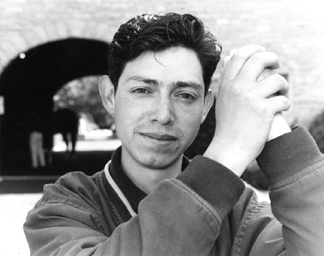Beyond the Border
The American Dream Transcends Well Beyond the Borders of the United States
By David Moss

Leaving everything behind to find your slice of the pie.
The American Dream can linger in the minds of every migrant worker entering the United States. Their mothers, fathers, wives, and children left behind so a slim chance of economic prosperity might filter into a reality. Agricultural jobs pay very little in Mexico, where as migrant workers can make $100.00 a day here in the US. This is the dilemma of many males forced to seek out those opportunities for their families, as well as for their future. The movie Beyond the Border examines the choices of one family... the Ayala Family. Three brothers, Gonzalo, Juan, and Marcelo all leave Mexico for the same reason: To have a future in Mexico, you have to leave Mexico.
The beginning of the movie is also Marcelo's beginning Beyond the Border. After having a discussion with other co-workers picking Cacti plants to make Tequila, he tells them you can make $100 a day picking tobacco in Kentucky. Every worker there laughs throughout the conversation, "what I could do here with a $100"? Marcelo explains that Michoacan, Mexico will always be his home, yet he must leave in order to provide a better life for his mother and father. His contact at the border (smuggler) will escort Marcelo across the desert during the night, ensuring better odds of survival. He recounts many stories of migrants being brutally beaten and left for dead before they even get across the border.
Juan, the middle sibling, has been in the US long enough to learn English. He works the seasons at Keeneland as a groomer in the horse stables. He, along with many other Hispanics are not allowed to ascend to other positions, but remain content that each has a job in Central Kentucky. Juan seems to have assimilated well into American culture, leaving many aspects of his former life behind. He represents the path of many Hispanics who have ventured into Central Kentucky years ago. His accent still lingers, but his marriage to a non-Hispanic clearly shows that Juan is no longer a resident of Mexico. He is now considered a US citizen. His children will grow up differently than that of other Mexican children. Juan's wife acknowledges that he does not even speak Spanish around his family - some of his cultural identity has already been laid to rest.
Gonzalo is the oldest, moving between Chicago and Lexington, always trying to find the right job. He acknowledges that drinking has become the only permanent fixture in his life, whereas his previous visions might have been of a family with kids running through the house. He's not allowed to visit his children anymore because drinking has consumed his life. Gonzalo is like many migrant workers who come to the US. His visions seemed so vivid when he young, but as he grew older, living in the US was a harsh reminder that his prosperity was only going to remain a dream.
The story examines the brothers of the Ayala family as they become interwoven throughout American culture. Marcelo becomes an American teenager as the movie progresses. He creates a music group, and eventually attracts a girlfriend. Juan explains of his first visit to Mexico once he gets married. He felt awkward crossing the border as a US citizen, realizing that he would never be a Mexican again. Even his parents could not communicate with his new family; this bothered him, knowing he had changed so much. Although he was perceived as an American by much of his family, he still fought much of the same prejudices that other Hispanics encountered. At Keeneland, Hispanics were not allowed to become "walkers" - individuals that moved the horses from the stables to the sales pavilion. Keeneland only used non-Hispanics for those positions.
Beyond the Border does a fine job of examining the lives of these three individuals. It allows the viewer a chance to identify and examine how far someone will go to briefly taste prosperity, even if it's just a quarter of what most Americans experience. Everyone who lives in the United States in an American. Some are just more qualified than others, but everybody works for the same dollar and the same dream. We all want an equal chance at a slice of the pie. The movie Beyond the Border illustrates how far someone will go just to get a quarter of that chance. Freedom is precious, life is precious, and financial security is precious; one can only hope that someday everyone can have all three.